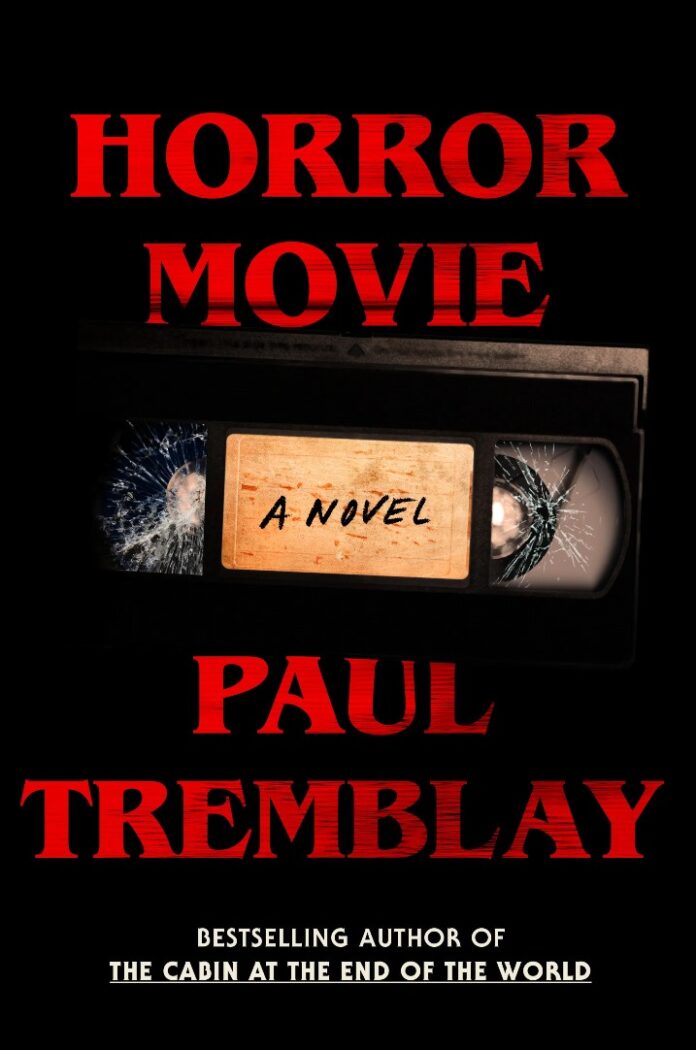There’s a very solid explanation for this: the book is dedicated in part to his memory, and one of the characters in the horror movie alludes to Straub’s work, Koko. These aren’t the only reasons I’m thinking of the two authors conversing with one another.
One of the things I’ve always loved about Straub is how his work matured and became weirder throughout the course of his career. Some authors discover their specialty and stick with it; Straub took bold chances that usually paid off. (Learning that Straub was a jazz aficionado clarified a lot of things for me.) Reading Paul Tremblay’s Horror Movie, I wonder whether he used the same method.
Tremblay’s books, A Head Full of Ghosts, Disappearance at Devil’s Rock, The Cabin at the End of the World, and Survivor Song, were all well-received from 2015 to 2020. It’s a heck of a run. (It also nicely matches Straub’s work released between 1979 and 1984: Ghost Story, Floating Dragon, Shadowland, and The Talisman—the last collaboration with Stephen King.) Tremblay could have easily continued in this vein forever, revisiting themes of possession, belief, and the end of the world from many perspectives.
That is not what he has done, however. On a planet where anthropomorphic animals live, Tremblay’s 2023 collection, The Beast You Are, contains a verse story. The Pallbearers Club, published in 2022, takes the form of an annotated text. “Some of Tremblay’s work has been rumored to be headed to the silver screen, including the aforementioned The Cabin at the End of the World,” I said in my assessment of the book. “What’s most intriguing about this story is how it sometimes seems like a response to that. It’s tough to envision this being translated into another media and doing nearly as well.”
Lastly, we have horror movies, which are really two separate documents, as we will discover later on. One of them is Horror Movie, an independent horror film from 1993 that was based on, you guessed it, horror movies. The second is a memoir by an unnamed actor who played the role of The Thin Kid in both the original and its remake/reboot.
A few bits from the 1993 film have emerged, but the film itself was never aired, so it’s important to highlight the difference between a remake and a reboot here. The fact that the actor’s memoir is really an audiobook will become apparent at a later point, further shrouding the conditions under which he is reminiscing.
He met Valentina in college (but not the same one), and in 1993, the narrator starred in an indie horror film that Valentina directed. Cleo, Valentina’s friend, wrote the screenplay. The film’s plot isn’t immediately apparent, but it starts with three high school kids bringing a fourth student—the Thin Kid—to a deserted school, where he wears a monster mask and performs a series of strange rituals.
One way in which the book muddles the boundary between real life and the stage is that the players (including Cleo and Valentina) portray characters who share their names. With multiple asides from Cleo in the descriptions of various situations, Tremblay provides us with much of the screenplay in the book.
However, it’s worth mentioning that this screenplay is very much portrayed as a recovered document. Some of the subtleties would not work well in a cinematic adaptation, even with elaborate voice-over narration on par with Malick’s.
Those glimpses of the 1993 production—both the script and the narrator’s personal memories—are intercut with images from today. The narrator talks with individuals who are interested in the project, including director Marlee Bouton, an accomplished independent filmmaker with a passion for horror. Tremblay foreshadows some extremely unpleasant things in these sequences for the 1993 film’s actors and crew. “Of course, you already know about Cleo,” the narrator says at one point—but of course, we don’t, not yet, but it certainly indicates that something horrible is lying just a few pages away.
The first version of the horror movie was never finished. It’s a fictitious cult film whose cult has grown around a small number of artifacts—relics if you will—that emerged from its difficult creation. It is one of the ways in which ritual practices are intertwined with both the general narrative of this work and the storylines contained within it.
While the two books have quite different tones, Horror Movie and The Pallbearers Club both enjoy narrative ambiguity; in both instances, how dependable you find the narrator will have a considerable impact on what you take away from the work.
“There is one interpretation of an upcoming horror movie in which the horrors shown on its pages are completely the result of humans mistreating one another. There’s also an interpretation where something far more odd occurs. Finally, whether or not a demonic presence is present, the results are equally scary.”
The narrator here may or may not be trustworthy, but he is not the only possibly untrustworthy narrator here. At one point, the script, supposedly from a 1993 picture, references a song that would not be published for another two years. I filed it away as a creative license until the narrator brought it up in the context of whether or not the script we’re reading is the same as the one used to film the first horror movie.
A new horror movie may easily have fallen on itself. It doesn’t reflect the complexity of its structure or the unique voice of its narrator, a character who is both a prankster and a trauma sufferer, with a captivating mix of everyman attitude or something essentially unknowable.
“It certainly doesn’t hurt that the new horror movie—’ Horror Movie’—is riveting in its own right, with elements of ‘The Cabinet of Dr. Caligari,’ ‘The Blair Witch Project,’ and ‘Lake Mungo.’ Tremblay’s work uses cinematic syntax, but its intentions are entirely literary—to terrifying effect.”


